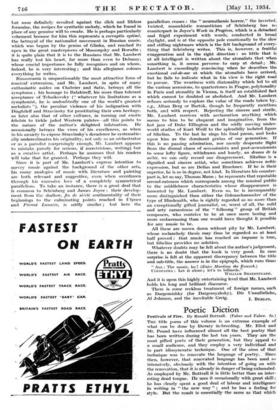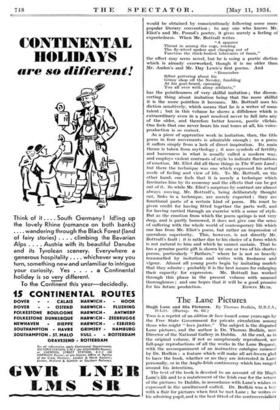Poetic Diction
Festivals of Fire. By Ronald Bottrall. (Faber and Faber. Gs.)_ Tax title poem of this volume is an extreme example of what can be done- by literary in-breeding. Mr. Eliot and Mr. Pound have influenced almost all the best poetry that has been written during the last ten years. They are the Most gifted poets of their generation, but they appeal to a small audience, and they employ a very individual and in part idiosyncratic technique. One of the aims of that technique was to renovate the language of poetry. Since then, however, that renovated language has been used so intensively, obviously with the intention of going on with the renovation, that itis already in danger of being exhausted. As employed by Mr. Bottrall it is little better than an inter- esting dead tongue. He uses it occasionally with great skill : he has clearly spent a good deal of labour and intelligence in writing in " the new way " ; and he has a feeling for style. But the result is essentially the same as that which
would be obtained by conscientiously following some more popular literary convention ; to any one who knows Mr. Eliot's and Mr. Pound's poetry, it gives merely a feeling of expectedness. When Mr. Bottrall writes
"A spanner
Thrust in among the cogs, rending The fly-wheel spokes and clanging out of Function the thick-bodied lubricants of brain,"
the effect may seem novel,_but he is using a poetic diction which is already overworked, though it is no older than Mr. Auden's and Mr. Day Lewis's first poems. And
" Remember Silber pottering about his Grimy shop off the Nevsky, fumbling At his goat-beard, caressing You all over with slimy sibilants,"
has the pointlessness of very skilful imitation ; the discon- certing thing about imitation being that the more skilful
it is the more pointless it becomes. Mr. Bottrall uses his diction sensitively, which means that he is a writer of some talent ; but in this volume he shows a diffidence which any extraordinary even in a poet resolved never to fall into any of the older, and therefore better known, poetic clichés. One feels that one never hears his real tones at all, his voice- production is so correct.
As a piece of apprentice work in imitation, then, the title poem in four movements is admirable enough ; as a poem it suffers simply from a lack of direct inspiration. Its main theme is taken from mythology ; it uses symbols of fertility and barrenness in what is usually called a modem way,
and employs violent contrasts of style to indicate fluctuations of emotion. Mr. Eliot did all these things in The Waste Land ; but there the technique was one which expressed his actual mode of feeling and view of life. To Mr. Bottrall, on the other hand, one feels that it is merely a technique which fascinates him by its economy and the effects that can be got out of it. So while Mr. Eliot's surprises by contrast are almost
always moving, Mr. Bottrall's, being deliberately thought out, links in a technique, are merely expected : they are
functional parts of a certain kind of poem. He must be given credit for having fitted together the parts well, and for having carried through an exercise with a sense of style. But as the emotion from which the poem springs is not very deep, and is partly borrowed, it does not give one the sense of suffering with the whole world of contemporary life which one has from Mr. Eliot's poem, but rather an impression of querulous superiority. This, however, is not directly Mr. Bottrall's fault ; it is rather due to his choice of a form which is not natural to him and which he cannot sustain. That he has a genuine poetic gift is shown by one or two of his shorter poemi, particularly " Bathers," where he is not so heavily trammelled by imitation and writes with freshness and vigour. Almost all young poets begin by imitating models that they admire ; probably it is the best means for enlarging their capacity for expression. Mr. Bottrall has worked through this phase in the present volume with unusual
thoroughness ; and one hopes that it will be a good promise









































 Previous page
Previous page